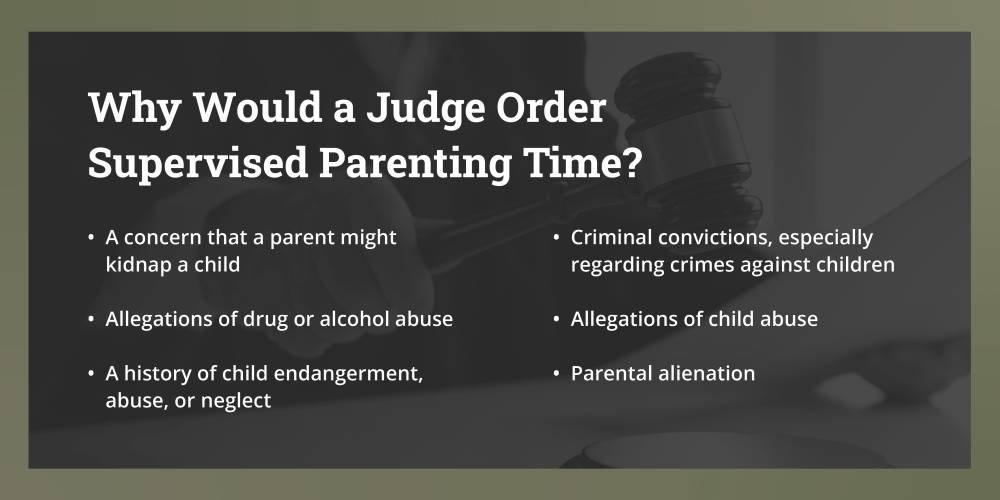630-462-9500
After Hour New Client Telephone Number 630-690-6077
1776 S. Naperville Road, Building B, Suite 202,
Wheaton, IL 60189
What Does it Mean if a Court Orders Supervised Parenting Time?
 The idea of spending any time with your children under someone else's supervision can feel humiliating and unfair, especially if the social worker is a supervisor and you are paying for their services. Yet some parents in Illinois are ordered to live with supervised parenting time every day.
The idea of spending any time with your children under someone else's supervision can feel humiliating and unfair, especially if the social worker is a supervisor and you are paying for their services. Yet some parents in Illinois are ordered to live with supervised parenting time every day.
Understanding why this happens and what the court wants to see is essential for getting through this tough time. It is important to remember that supervised parenting time is not necessarily indicative of your skills as a parent and that, with the help of a Wheaton, Illinois parenting time attorney, it is possible to move beyond this stage.
Why Would a Judge Order Supervised Parenting Time?
Supervised parenting time means one parent is not allowed to be with his or her child alone. If supervised parenting time is ordered and the court finds out the parent was with the child without supervision, it could potentially end the parenting time altogether. Parenting time is not supervised unless the judge believes the parent could endanger the child.
To obtain supervised parenting time, the parent requesting it has a high burden of proof to show that time alone with the other parent could endanger the child’s mental, physical, or emotional health. This is not easy to prove, which is why supervised parenting time is fairly rare, only granted in limited circumstances.
If there is a question regarding the parent’s fitness or the child’s safety when with the parent, a judge will order supervised parenting time. Unfortunately, while in some cases this concern is justified, other times, it is the result of false accusations made by a parent in the heat of a contentious divorce or custody case. Common reasons that judges might order parenting time include, but are not limited to:
- A concern that a parent might kidnap a child
- Allegations of drug or alcohol abuse
- A history of child endangerment, abuse, or neglect
- Criminal convictions, especially regarding crimes against children
- Allegations of child abuse
- Parental alienation
After hearing evidence regarding one parent’s belief that the other is a danger to the child if allowed to spend time alone with the child, the family court judge will decide whether supervised parenting time is appropriate. If the judge orders supervised parenting time, the parent will be allowed to see the child in a controlled setting with another adult present.

What is Supervised Parenting Time Like?
How supervised parenting time works will depend on the circumstances of each case. A parent ordered to have supervised parenting time must have someone chaperone the interactions between the parent and child.
The chaperone may be a relative, like a grandparent, or a family friend. In some cases, the adult present will be a social worker or someone similar, for whom the parent is required to pay for the time spent supervising the parenting time.
Typically, supervised parenting time takes place once a week for two to three hours. Parenting time may occur at a park, weather permitting, and, depending on the child's age, in the parent’s home, at a child-friendly restaurant, or in the social worker’s office.
Family courts virtually always believe that, ideally, the child's best interests are served by having regular interactions with both parents. This means that the ultimate goal of supervised parenting time will be unsupervised parenting time, barring a parent who remains a safety threat to the child.
What Are the "Rules" Surrounding Supervised Parenting Time?
Supervised parenting time rules are usually tailored to the case's unique circumstances. The supervised parent and the child are encouraged to talk and play during parenting time, but there may be one or more of the following rules in place:
- The supervised parent may not insult or say negative things about the other parent or other family members to the child.
- Corporal punishment (spankings) is not allowed, and the supervised parent may not threaten or insult the child in any way.
- The supervisor is usually required to stay close enough to see and hear the interactions between the supervised parent and the child at all times.
- The supervised parent must sometimes obtain permission from the court before bringing gifts for the child.
- The supervised parent may not exchange private notes with the child.
- The supervised parent must always arrive on time and must never be under the influence of drugs or alcohol.
- The supervised parent may have restrictions on photographing, videotaping, or audio-recording the child.
- Depending on the situation and circumstances (if the parent was physically abusive to the child), there may be restrictions on physical contact between the supervised parent and the child.
- If the supervised parent breaks any rules in place for his or her specific situation during the supervised parenting time, the supervisor will end the visit early and tell the parent why they are doing so.
None of the conversations between the supervised parent and the child are considered confidential, and the supervisor usually takes notes during the supervised parenting time to present to the court. A parent ordered to have supervised parenting time may feel that the situation is unfair and unwarranted.
Regardless of those feelings, the parent who follows every court-ordered rule to the letter is much more likely to end up with unsupervised parenting time in the future. If the supervised parenting time results from false allegations on the part of the other parent, the supervised parent must let his or her lawyer work on proving that and changing the supervised parenting time.
Contact a DuPage County, IL Parenting Time Lawyer
The goal of the experienced Wheaton, IL parenting time attorneys with The Stogsdill Law Firm, P.C. is to reunite you with your children and get you the full allocation of parental responsibilities and parenting time you deserve. Our firm is one of the most prestigious in the area. We are a large firm that offers our clients extensive resources and experience.
If you have had your parenting time restricted to supervised time only, consider meeting with one of our attorneys by calling us today at 630-462-9500. We will help you present a clear, honest representation of your parenting skills and commitment to your children that gets you back on track as soon as possible.




















